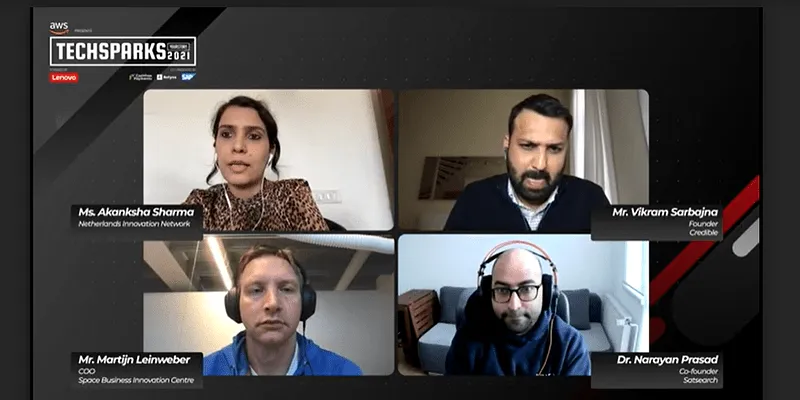The Netherlands spacetech ecosystem unfolds immense possibilities for Indian startups, say founders
The Netherland’s spacetech ecosystem seems to be booming with potential for growth and enhancement. During a panel discussion at TechSparks 2021, founders and industry leaders discussed the future roles and offerings of the same.
The term global spacetech ecosystem invariably gets attached to countries like the UK, the USA, and France, unfolding a host of opportunities in the domain.
Now, the Netherlands might not be the immediate name that emerges while discussing the spacetech domain. However, it has a thriving ecosystem relating to the spacetech sector, with the existence of 250 space companies, along with knowledge institutes ensuring technical know-how for the companies.
Going back to the upstream sectors, the companies usually have capabilities throughout the value chain, designing components for rockets and satellites, while the downstream sector companies make use of the satellite data for several applications like water, agriculture, energy, environment, etc.
The stakeholders on the government’s side include the Netherlands space office, which coordinates and provides the whole policy and the regulatory framework. Besides, there have been joint research projects between the countries, enhancing the same.
Now, for the unversed, the European Space Research and Technology Center (ESTEC) is located out of Noordwijk, and the Space Business Innovation Center (SBIC) is located at the Enel Space Campus and offers startups a community and a co-working space, with an attractive soft landing and incubation space programmes, made to use by various Indian companies.
At YourStory's flagship startup-tech conference, TechSparks 2021, founders and experts from India and the Netherlands came together for a panel discussion on the topic: 'Rocketing into the future with Netherlands’ spacetech ecosystem'.
The panel was hosted by Akanksha Sharma from Netherlands Innovation Network, with panellists like Martijn Leinweber, COO, Space Business Innovation Centre; Dr Narayan Prasad, Co-founder, Satsearch; and Vikram Sarbajna, Founder, Credible.

Offerings by the ecosystem
Martijn delved deeper into some of the programmes by SBIC, meant for supporting Indian startups. For instance, the Ignition Program is an incubation programme helping in the pre-developing phase. Then comes the ESA BIC program, which generally has a span of anywhere between one to two years, and eight startups get qualified every year for this program.
“Here, we provide business, technical, and financial support without taking equity, thereby giving the startups access to the European network, where they can also make good use of the ESE branding,” he said. The criterion for this includes companies dealing in innovative space technology or data, not older than five years, and should be a citizen of the Netherlands.
They also have the six-month Soft Landing program willing to support tech and space-based companies who want to step ahead in the Netherlands tech ecosystem.
“We help them with the whole application phase, along with providing a mentor and business support, promising a soft landing within six months in the Netherlands,” he assured.
There is also another part attached to the enrollment of these programmes, which includes startups integrating into the community, co-working with people at the meeting space, and being a part of the masterclasses and the community events. Also, while applying for a Startup Visa, the startup owners need to reach out to the facilitators designated by the government, and SBIC is one of them.
“We need to provide a letter of support for the startups if we consider the person is eligible for getting a visa, and also for its renewal after a year,” said Martijn.
Satsearch is a six-year-old startup that made use of the ESA BIC program. Discussing the offerings made to use, Dr Prasad expressed gratitude for the initial offerings of capital and access to the networking events and ESTEC, which had gained the needed prominence to Satsearch.
“Today, Satsearch is the largest global marketplace for space, with close to 15,000 monthly active users in 100+ countries, boasting of 3,000 suppliers. Besides, we have passed on opportunities worth about 250 million Euros to suppliers for the last year. Reaching customers in twenty-five different countries, Satsearch is a remote company based in the Netherlands, but has people working in different timezones, and has grown organically,” he added.
Dr Prasad also feels that the ease of doing business in the Netherlands starts from English itself.
“If you are a foreign entrant, language becomes a key constraint of initiating business in most parts of Europe. But in the Netherlands, the English-speaking population is quite high, thereby eradicating the problem of language as a barrier.”
“Besides, the Dutch people have a straightforward culture that helps to understand whether the customer is interested in buying the products or not, thus benefiting the early-stage companies. Lastly, the ability to structure businesses to protect the founders’ interest is strong in the Netherlands, giving us special privileges, lacking in other parts of the globe,” he added.
“The ESA networking community has been immensely beneficial in seeking the right kind of customers from all over Europe, and we are super thankful for being able to become a part of the ecosystem and grow there,” said Dr Prasad.
Here, we also had Vikram sharing his latest experiences of joining the ESA BIC Incubation Program. “The thought of expanding internationally and technically were the major factors for seeking a base where we could cater our services globally. We also wanted good technical support, and thereby thought that the program was best suited for us,” he added.
With considerable wealth in terms of technical support, the community, with varied types of satellite-based companies, became an invaluable support for Vikram. “The funding and technical support made us choose the incubation programme, with the straight-forward process, and clear ways”, he said.
A valuable piece of advice
Speaking about some of the most valuable tips for Indian startups in their inception phase, Martijn said, validation at the earliest is most important.
“The space market itself is a long journey, so be prepared for that,” he added.
“It’s a question of what your product is and who your target customers are. If you believe that your product can do good business in Europe, then you can consider expanding your footprint or think of the Netherlands as a home to create a footprint for yourself. Also, travelling is easier and convenient between the two countries, which is a brownie point,” explained Dr Prasad.
“Being in the Netherlands helps to integrate with an open and diverse culture, along with the smooth process and programmes by ESA. Thus, invariably, an obvious choice for starting or expanding business,” added Vikram.
To log in to our virtual events platform and experience TechSparks 2021 with thousands of other startup-tech enthusiasts from around the world, join here. Don't forget to tag #TechSparks2021 when you share your experience, learnings and favourite moments from TechSparks 2021.
For a line-up of all the action-packed sessions at YourStory's flagship startup-tech conference, check out TechSparks 2021 website.

Edited by Megha Reddy









